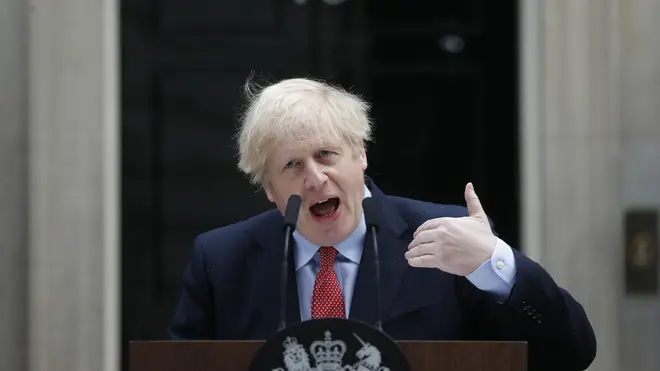
Ben Kentish 10pm - 1am
27 April 2020, 09:19

Prime Minister Boris Johnson addresses the nation after returning to work
Boris Johnson has said the UK is starting to "turn the tide" against Covid-19 but there will be no changes to lockdown as we are in the moment of "maximum risk".
Speaking outside Downing Street, the Prime Minister said the country was winning the first phase of the fight against coronavirus as he made his first public statement since returning to work after being admitted to hospital with the disease.
He said he had been "away from my desk for much longer than I would've liked".
Addressing the nation he said: "Once again I want to thank you the people of this country for the sheer grit and guts you've shown and are continuing to show.
Read more: What are the rules of the UK coronavirus lockdown?
"Every day I know that this virus brings new sadness and mourning to households across the land."
He said the pandemic was the "biggest single challenge this country has faced since the war" but the PM said, "it is also true we are making progress."
Read more: What is phase 2 of coronavirus? And what are Boris Johnson's five tests?

He said, "there are real signs now we are passing through the peak."
"We are on the brink of achieving that first clear mission, to prevent our National Health Service from being overwhelmed."
He said this was the moment the UK can press home its advantage, but add it was also "the moment of maximum risk."
He warned that while some people may think now was the moment to "go easy" on social-distancing guidelines, but now was not that time.
Read more: Can you drive during the UK coronavirus lockdown?
Listen & subscribe: Global Player | Apple Podcasts | Google Podcasts | Spotify
The PM first announced he tested positive for Covid-19 on March 27, and was admitted to hospital on April 5 after his condition deteriorated.
He spent two nights in the intensive care unit at St Thomas' Hospital before finally being released from hospital on April 12 and spent most of his recovery at his country seat of Chequers in Buckinghamshire.
Read more: Government 'on target' to reach 100,000 coronavirus tests per day this week
Mr Johnson, drawing on his own battle with Covid-19 which put him in intensive care, said: "If this virus were a physical assailant, an unexpected and invisible mugger - which I can tell you from personal experience, it is - then this is the moment when we have begun together to wrestle it to the floor.
"And so it follows that this is the moment of opportunity, this is the moment when we can press home our advantage, it is also the moment of maximum risk.
"I know there will be many people looking at our apparent success, and beginning to wonder whether now is the time to go easy on those social distancing measures."
He said he understood "how hard and stressful it has been to give up, even temporarily, those ancient and basic freedoms".

Dancing NHS staff vow ‘coronavirus wont stop us’
But he warned the potential of a second spike in cases risked "economic disaster".
Mr Johnson added: "And so I know it is tough. And I want to get this economy moving as fast as I can, but I refuse to throw away all the effort and the sacrifice of the British people and to risk a second major outbreak and huge loss of life and the overwhelming of the NHS.
"And I ask you to contain your impatience because I believe we are coming now to the end of the first phase of this conflict and in spite of all the suffering we have so nearly succeeded.
"We defied so many predictions. We did not run out of ventilators or ICU beds. We did not allow our NHS to collapse, and on the contrary, we have so far collectively shielded our NHS so that our incredible doctors and nurses and healthcare staff have been able to shield all of us from an outbreak that would have been far worse and we collectively flattened the peak."